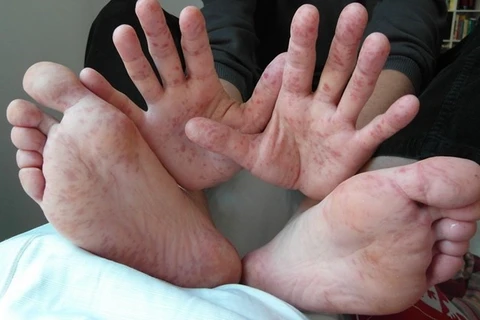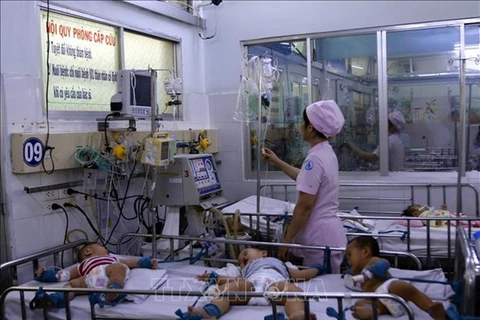 Students in Bac Ninh province play football. Physical inactivity is a growing problem among Vietnamese youth (Source: VNA)
Students in Bac Ninh province play football. Physical inactivity is a growing problem among Vietnamese youth (Source: VNA) Hanoi (VNS/VNA) - Some 40 percent of primary and secondary school students in Hanoi and Ho Chi Minh City are inactive, a survey by the National Institute of Nutrition revealed.
“They do almost no physical exercise,” Tran Khanh Van, deputy head of the institute’s department of micronutrients, told Kinh te & Do thi (Economic & Urban Affairs) newspaper. “A sub-survey even shows that most of students do not play sports.”
According to Van, the average height of Vietnamese people is less than other countries in the Asia region.
While the average heights of Vietnamese men and women are 164cm and 153cm, respectively, the numbers for Japanese adults are 172cm for men and 158cm for women.
The country’s average height increased by 1.1cm over the last decade. Over the last 15 years, the average height of Japanese people increased by 2.8cm for men and 2.5cm for women.
“It means height does not completely depend on genes but also on nutrition, environment, psychological issues and fitness,” said Van.
Research by the institute shows that, among factors affecting height growth, genetic factors account for only 23 percent while fitness and diet make up 20 and 32 percent, respectively.
“Appropriate exercises can help children eat well, sleep tight, accelerate their physical development and negate genetic disadvantages,” Van said.
Physical inactivity can lead to serious health problems including diabetes, obesity and cancer.
The institute’s research, conducted on more than 17,000 people aged at least 25, shows that 25.1 percent suffer cardiovascular diseases while 16.3 percent are obese.
Vietnam has set a goal to reduce inactivity by 10 percent by 2025 and to keep obesity and hypertension under 15 and 30 percent, respectively.
Minister of Health Nguyen Thi Kim Tien stressed the importance of hygiene, a balanced diet and physical exercise to having a healthy body.
The Ministry of Health encourages people to do more exercises, quit smoking, limit alcohol intake, reduce sugar and salt intake and eat more fruits and vegetables.
“Children need to exercise to release their energy, understand their inner selves and connect with the outer world,” Huong Ly, an experienced Montessori teacher in Hanoi told Vietnam News. “Exercises and children are close friends who should not be apart. Exercises are a joy,” she added.
Minister of Education and Training Phung Xuan Nha said the ministry asked schools to ensure all students exercise daily, offer facilities for physical education and encourage the establishment of sports clubs.
Achieving 10,000 steps a day is Tien’s simple recommendation for busy people to keep fit. She also recommends monitoring blood pressure regularly.
“Vietnamese people do not pay much attention to healthcare at a young age even though up to 70 percent of deaths are related to non-infectious diseases which are caused by inactive lifestyles,” she said.
According to Ly, children living in urban areas do not have many safe playgrounds or open spaces to participate in outdoor activities. Parents’ fears about safety also contribute to their children’s inactivity.
By using smartphones as babysitters, parents prevent their children from developing healthily and happily. Ly recommends parents become role models by creating opportunities to do exercises with their children.
“If your house is too tiny for kids to run around, a weekend trip to a park or a mountain is ideal for the whole family to breathe fresh air, be more active and get close to each other,” Ly said.
“Small kids should be told about how exercises help them feel happier and more comfortable,” she said. “Adolescents, meanwhile, should learn about how their immune system improves, their muscles build and their energy grows by working out.”
Parents can also motivate their children by telling them about the benefits of physical training and setting realistic goals for them to achieve.
“It may be as easy as running 10km in a month,” she said.-VNS/VNA
VNA






















